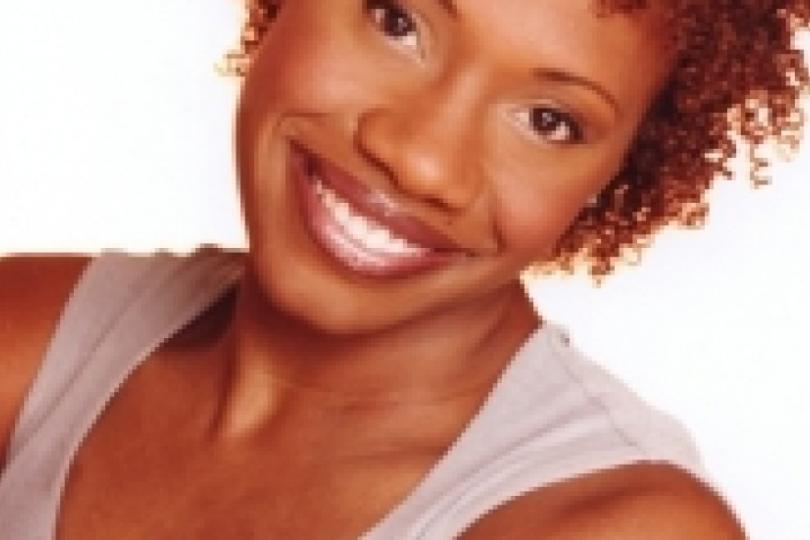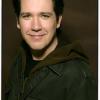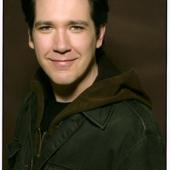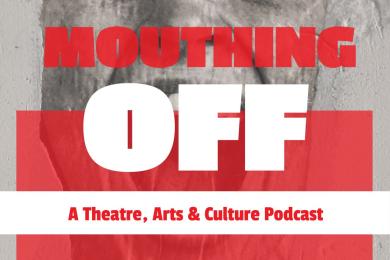Playlist profile: Sha Cage
Interview

After the big bad snow but before the return of the big bad cold, I went to talk to Sha Cage in her home in Columbia Heights. Her candor, warmth and passion were a stark contrast to the dreary wasteland just beyond the doorway.
Cage, currently in The Ballad of Emmet Till at the Penumbra Theater, spoke to me just before giving a talk to a class of BFA acting students at the University of Minnesota. The juxtaposition – a play, historical content, bringing up the next generation of practitioners – of art, history and social responsibility is a hallmark of Cage’s life and career choices. She uses the word community more than most people I know, and out of her mouth it sounds not like a cliché but rather like a call to action.
How’s the show going?
Every night this show gives you a different surprise. Emmet’s spirit kind of comes into the room, I mean it has to, right? It’s about him. So his spirit comes into the room and shakes things up. As actors we kind of think we know what’s going to happen… and then it’s different! It keeps us on our toes. But also the interaction we’ve had with the audience and the community – it’s like 50/50. Some people know about Emmet Till and a lot of people don’t. So it just reminds you how important it is for us, not necessarily to be doing historical plays, but plays that matter, that fill the void. It’s filling, it fills us up. It’s like good food.
Who are some of your favorite actors?
I’m really influenced by people around me mostly, so I’m often influenced by young people. Like this young actor Nikei Cadre. She’s really young, she’s at the U in the BFA program and she did Mary T and Lizzie K with me last year [at Park Square]. I get so inspired by the youthful energy, and the not knowing and the completely in it, being completely in the moment. It keeps me alive. So actors like that.
There’s this other young actor that I’m mentoring right now, her name is Niche, and she called me the other day and said, I need you to look at my piece, I’m going to send it in to the Disney Channel. She’s got these huge aspirations, which I love!
I’m inspired by older actors. I was watching the movie Imitation of Life and the older black woman who was one of the first ones to really get national recognition [Juanita Moore]. Every time I watch that movie and tell that story I get emotional about it, because I know what it’s like to be the only one in the room, and I can’t imagine what it was like for her at that time. To be not just the only one in the room but one of very few even on the platform. And to still be so committed to the art, regardless of all the obstacles. And then I was looking a picture of Cicely Tyson the other day, from like the Bad Makeup Days through the Bad Lighting Days, I mean she lived through it, and to still have such a varied career! So actors like that on the larger platform inspire me.
Locally, Sally Wingert, Sarah Agnew, Regina Williams, Greta Oglesby, I mean there’s so many. Aimee Bryant, Tonia Jackson, Laurie Carlos. I got a lot of my early inspiration from actors at the Penumbra Theater. Dawn Renee Jones is someone who is an actor, movement artist who was a mentor to me when I was at Macalester. We were doing this piece and we wanted to do something that spoke to people of color and people in marginalized communities. So they brought in a director of color, and I remember when she walked into the room I just thought, “Who is this beautiful woman?!” She was so charismatic and down to earth and she was about the craft and about us growing and challenging us! I had never in my life had that kind of opportunity.
In addition to being an actor in plays you are known as a spoken word artist and a maker of devised pieces. Do you draw distinctions between the kinds of performance you do?
It just dawned on me a couple of year ago that all the things I do are kind of broken up into separate communities. Some of the young people I work with came to see me in Clybourne Park and they said, “I didn’t even know you did theater.” And I thought, how could you not know that?! Because to me, I really believe they’re seamless. I see the layers of everything in my head, and most of what I do kind of lines up with what I’m trying to say and do as an artist. But I think people around me make really clear distinctions.
In my solo work, which I started in the last couple of years, I can see it all blending: hip-hop, spoken word, traditional theater forms. It’s like a playground where all these things can come together. Which is why I think it’s essential for me to keep doing it all.
What would your dream career look like?
Oh my god. My dream career. That’s a hard question.
It would involve me doing my own work, self-generated, devised, highly community-based in terms of themes. And I would be able to travel internationally and perform this work. And I could do it on my own schedule. So travel in the winter when it’s freezing in Minnesota. In addition, I would do at least two main stage theater pieces a year at theaters that I love and respect and do work that I find meaningful.
And then I’d like to be able to teach at a university level and to a degree where I don’t feel I’m wrung out. And I’d be able to control the balance between all these components.
Are there roles you’ve always wanted to play?
Not really. I thought briefly about being in Mountaintop when I went out to Broadway with e.g. [bailey, her husband] to see it. It’s just one woman, one man, and I thought, I would love to do that, I could do that. I would want to do that. But I haven’t fallen in love with the idea. So not really. I think that probably makes me an odd actor.
What’s the best advice you ever got?
Dawn Renee Jones on that show we did in college taught me about being honest onstage. A character reeks, smells of whatever you out into it. So if you put in honesty, that’s what the audience will get.
The other advice, and it’s probably the most important, and I’ve never shared this with her… I was doing a production of The Conference of the Birds at Pangea World Theater years ago, and I was young and excited and confident and thought I was so good. And Isabel Monk pulled me aside, and in some way she let me know that I had a lot of work to do. And you could take that as, you’re not so great, but she said it in such a clear way, with no issues on it. She just wanted me to grow. And she didn’t really know me at the time. She said, you gotta listen, listen to the language, and keep working at it. And I knew who Isabel Monk was, I knew she was important but all I could think was, she don’t know, I am in this, I am tearing it up! It literally didn’t register until four years later when I realized, wow, I was not that great. What she was saying was that I was just on the upper layer of the skin of it, and I needed to get down in it. You gotta listen. You got work to do. I couldn’t hear it then but it really helped me. I should tell her.
How did you start as a performer?
I really credit growing up in a Southern Baptist church where two things happened: something was always theatrical, and there’s a nurturing that happens early on that’s not always named for young kids coming into their own. They must have seen that I had an artistic bone in me, and I liked speaking.
My earliest beginnings were I was asked to create the church welcome. I took that and ran with it. If that hadn’t been given to me I don’t know if I would have ended up in acting. I got creative with it and it sparked my interest in poetry. I would write things out and put rhymes in it. And the people loved it so I got to know early what it means to be in front of people and what it means to be celebrated. I was taught that I could create something for my community and it would mean something.
When did you decide to make it your profession?
In college, at Macalester. I was invited to be part of a collective in the making called Sisters in Struggle. A number of women from the African Diaspora came together, there were two of us from the US, and we knew wanted to perform and use material from poets and radical thinkers that were women of color as the foundation for the collective. We used a lot of Sonia Sanchez, a lot of Maya Angelou. We remixed their stuff and performed it, and over time we would add a little of our own material. We became celebrated at school, in the college environment, and we even traveled with it, went to Philadelphia. As that collective grew, I knew there was something powerful in women of color coming together to tell their own stories.
Why do you act?
I think if I didn’t do it I would be incomplete. I think acting and theater are on my path in terms of what I’m here to do, the story I’m here to tell. I believe that the art of acting allows us to tell a critical story and that is what I want to do and I feel it’s in line with my purpose.
I love it. I act because I love it.
What keeps you going?
Day to day reality. The fact that there’s so much work to do. We have a lot of work to do as a community and it can be a burden and it can be a challenge but it’s also exciting. It keeps me going. I can see the texture of what we’re putting together as a people.
Having a spiritual foundation at my core.
My family, both in blood and in the community.
If you could change one thing about our professional world, what would it be?
The way we’re respected. And I believe that immediately translates to compensation. It bothers me that I see incredible artists who don’t know where their next paycheck is going to come from. Because the work we do is critical to who we could be as a people, as a community. I would change the value system around it. So that theater artists are really able to make a living and support their families and not have to think about all that when they choose which pieces they’re going to do. In the last two years I’ve talked to so many people who’ve said, I just can’t do it anymore. They’re switching professions, even though they know this is where their calling is.
So that’s it, that’s the first thing I’d change. There’s some other stuff I’d change, but that’s the first!




